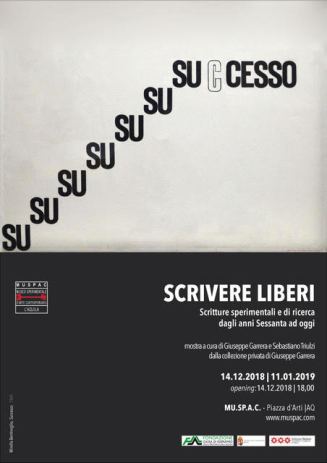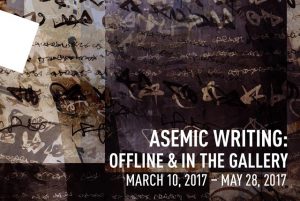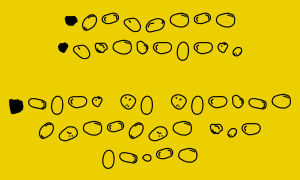The exhibition SCRIVERE LIBERI will be inaugurated in L’Aquila, on Friday 14 December 2018, at 18:00 , at the headquarters of the MU.SP.AC in Piazza d’Arti . Experimental and research writings from the sixties to today , edited by Giuseppe Garrera and Sebastiano Triulzi .
The theme of the exhibition is that of the liberated language, of the game and of the grammatical freedom, of the crossing of the boundaries of words, of the experimentation on the language, of the verbal, concrete and asemantic search for verbs from the sixties until today.
Central topics for MU.SP.AC, which has always paid attention to the close reciprocity between the various expressive forms of artistic language.
The relationship between poetry, figurative arts, sound, theatricality was born for the first time in Filippo Marinetti’s words in freedom , in the global avant-garde of Futurism, as a linguistic tool to effectively translate the new sensitivity for great philosophical and scientific discoveries. of the early twentieth century (“time and space died yesterday”). By bringing Art into Life and Life into Art, the Words in freedom “They orchestrate the colors, the noises and the sounds, they combine the materials of the language and the dialects, the arithmetic and geometric formulas, the musical signs, the old, deformed or new words, the cries of animals, beasts and engines” (FM ). They are “drawn analogies” in which the sense of the word is also graphically described by the way the word is arranged, in order to be interpreted theatrically, as a musical score.
Research poetry, concrete, visual, up to asemic and purely graphic experiments continued in the aftermath of the Second World War, precisely from the need to expatriate from the language, to free words, the world and oneself.
A furious and playful poetic, international, transterritorial season developed immediately, made of boundaries and overcoming of barricades and linguistic fences, between jeux des mots , verses, calligrams, nonsense, disseminations, syllabic pinwheels, verbal materials, alphabetic euphorias, towards new lands, to get rid of the meaning and live without languages, homelands and grammatical reasons.
The work of those happy destroyers of all letters and all alphabets has never ceased and continues in the territories of today’s verbal research, even more than in the past, dreaming of a catastrophic, extraterritorial, fluid, impregnable language that cannot be left talking and grasping, which does not persuade and commercializes the world and feeling: an exemplary project of rebellious writings (asemantic, childish, unaligned, disobedient, incomprehensible, wrong) not to “read” but to “see”, complete with elocutory disappearance of every self in view of a verb-vocal space , where to lose hopelessly and from which to never return. It represents the happiness of wandering through the territories without excesses and boundaries of poetry, between sounds, stammerings, syllables, lallations, stammering, disgraphies, in a great tribute to the language and realms of insignificance, to familiarity with senselessness and absurdities and little serious justifications for the art of making verses and creating sounds.
As Emilio Villa wrote, master of all: “We want to bring into view, in the aura, in the mail, in the area the fundamental experience of living without languages, removing and cutting our language, not to speak, not to lick, not to die “
The most important historical and current protagonists of this avant-garde are on display, from Hansjörg Mayer with the legendary “future” editions to Timm Ulrichs , Klaus Burkhard , Max Bense , Reinhard Döhl , Bob Cobbing , Ben Vautier , Ilse and Pierre Garnier , Eugen Gomringer , Hiro Kamimura , Yoko Ono , Augusto De Campos , Ferdinand Kriwet , Henri Chopin , Gerhard Rühm , Jiri Valoch , Endre Szkárosi , KatalinLadik , Anne Tardos , Tóth Kinga, Soós Gergő, Szilágyi Rudolf, Lucinda Sherlock , Jean-Crtistophe Giaccottino , Anneke Baeten , Robert Keith , Emilio Villa , Carlo Belloli , Adriano Spatola , Arrigo Lora Totino , Anna Oberto , Giovanna Sandri , Patrizia Vicinelli , Irma Blank , Mirella Bentivoglio , Elisa Montessori , Rosa Foschi , LucaPatella , Marco Giovenale , Mariangela Guatteri , Enzo Patti , Ivana Spinelli , Laura Cingolani , Gianni Garrera , Francesco Aprile , Francesca Biasetton , Federica Luzzi , Jessica Japino , Rafael González , Jim Leftwich , John M. Bennett , Federico Federici , Carl Baker , Max Renkel , Axel Calatayud , Sacha Archer , Dirk Vekemans , Mike Getsiv, David Kjellin , Rosaire Appel , Lina Stern , Matteo Fato , Valeri Scherstjanoi , Petra Schulze-Wollgast , Dona Mayoora , Luis González Boix , Luc Fierens , Fabio Lapiana , Carmen Racovitza , Laura Ortiz , Tchello d ‘ Barros , Cecil Touchon , Miriam Midley , John SH Mountain , Cecelia Chapman to name a few: Germans, Hungarians, Swiss, Italians, Japanese, Brazilians, Romanians, Russians, French, Finns, Portuguese, Swedes, Canadians, Australians, Ukrainians, Poles, Americans, together happy subversors of all letters and all alphabets .
*
MU.SP.AC
Experimental Museum of Contemporary Art
L’Aquila, Via P. Ficara – Piazza d’Arti


